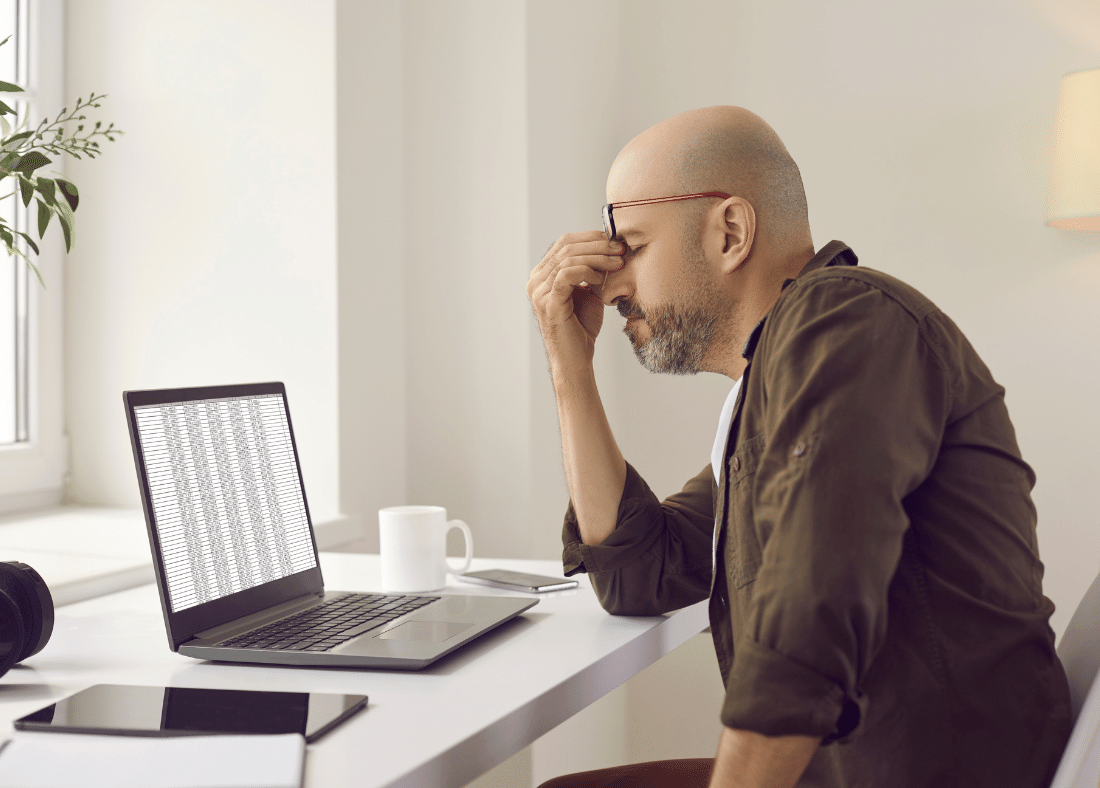How Much Screen Time is Too Much (And How to Break Free From It)?
Andy Mant
Numerous articles on screen time have noted that too much screen time can be detrimental.
Today, we’ll discuss the following:
- How many hours of screen time is healthy
- How long should you be on your phone
- How to spend less time on the phone
- Tips for reducing your screen time
How Much Screen Time is Too Much?
According to Nielsen research, we spend a lot of time in front of a computer or other electronic device. In fact, on average, American adults spend 11 hours a day in front of a screen.
Unfortunately, many of us are compelled to spend much of our waking hours in front of a screen due to our professions. However, a variety of health risks have been linked to excessive screen usage. We'll explore these symptoms in-depth in our next section, but here is a quick overview:
- Sleep deprivation
- Eyestrain and migraines
- Addictive Behaviour
- Lethargy
When researching how much screen time is healthy, the recommendation is that people spend no more than two hours a day in front of a screen outside of work.
Try picking up a new hobby, engaging in physical activity, or playing a board game instead of sitting in front of a screen. You might be surprised at how much there is to do outside of a screen.
Identifying Too Much Screen Time: Symptoms to Look Out For
Although not everyone has succumbed to internet addiction, the nature of our jobs and our lifestyles make us very susceptible. Here are a few indicators that you may be in front of the screen for too long:
Poor Sleep Habits
A steady stream of visual stimuli from screens might make it harder to wind down at the end of the day, mainly due to the blue light produced by our devices. You can help reduce its effect with Blue Light Blocking Glasses.
Eyestrain
Using a computer or smartphone for long periods can induce eye tiredness and blurry vision. Screen glare and display brightness might exacerbate the strain on your eyes. Stress can cause headaches over time.
Addictive Behavior
Due to the sheer amount of research that has been allocated towards digital marketing, our smartphones have become dopamine depositories. Unfortunately, as with anything that stimulates our pleasure centers, people may get addicted to their smartphones and even suffer withdrawal symptoms when they cannot use their phones or applications.
Lethargy
Many sorts of regular physical activity, such as going for a walk, cleaning the home, gardening, indulging in active hobbies, or exercising, may be diminished as a result of excessive screen time.
The Benefits of Less Screen Time
It’s clear that using a screen for extended periods can be detrimental to our health. And, if we’re all being honest, most people could probably do with less screen time. With that in mind, let’s look at the benefits of reducing screen time.
Decreased Stress
Don't overlook the value of taking care of your stress levels. Over the past few years, many of us have been overwhelmed by our screen devices. They are a constant in our lives. However, you can decrease your stress levels when you step away from the screen more often. Sometimes simply focusing on what’s really important—like the people around you rather than those online—can do wonders for you.
Improved Productivity
If you're like us, you'll procrastinate while the clock is ticking, and technology may be a huge distraction that further inhibits your productivity. An easy way to reduce your screen time is to remove apps that distract you from your work. For example, if you waste too much time on social media, it might be time to take a break. By reducing the channels you have to access your various social media accounts, the less likely you'll be tempted to peruse endlessly through the infinite posts.
Several free or low-cost applications allow you to lock your phone for varying amounts of time.
Improved Sleep Routine
Reducing time spent in front of screens has the added benefit of improving one's sleep. You may want to look into the possibility of using blue-light-blocking glasses before going to bed, as the blue light from screens can also disrupt your sleep patterns.
Placing your phone away from your face as you sleep can help you avoid the temptation of checking or turning it on in the middle of the night.
Improved Overall Health
Research shows a link between excessive screen time and a lack of physical exercise (let's face it, the more time you spend in front of your cell phone, the less physical activity you are performing).
By reducing screen time, you have more opportunities to start healthy habits.
How to Reduce Screen Time: Tips & Best Practices
While we're more than well-aware that screens have become intrinsically part of our daily lives, even a short period of digital fasting can have a significant positive impact on your well-being. Reduce the amount of time you spend on your phone or computer by following these simple steps.
Put the Phone Down While Eating
If you eat in front of the television, check up on the news, or scroll through the endless number of posts on social media, you're less likely to enjoy the meal in front of you while increasing your chances of overeating.
Instead, try to sit around a table with friends and family or listen to music.
If Possible, Keep Work at Work
Avoid spending too much time checking on work emails at home, as this might raise your stress levels as well as your screen time. Disconnecting from work can be difficult to do, especially if you work from home. But, taking a break from work is critical to your well-being.
Use a Screen Time Monitor
Due to the widespread availability of healthy screen time controls on smartphones, users can now monitor how much time they spend on various applications each day or week and make necessary modifications. Setting a time limit will result in a screen notice when the allotted time has expired.
Set Up Break Reminders
If you have trouble turning your attention away from the screen, consider using technology to help establish screen time rules.
Set a timer on your phone or calendar to remind you to take breaks throughout the day. Turn off alerts from communications or social media networks to prevent distractions.
Take Stretching Breaks
If you work in front of a computer, take a 30-minute break and look away from the screen at least once each hour.
Go for a walk or a jog if you can. Stretching your back and neck while seated can help maintain your muscles flexible.
The Bottom Line
Disconnecting from the screen entirely is most likely an impossible endeavor for most of us, and knowing exactly how much screen time is too much has yet to be concluded. That said, we can take steps to ensure we remain as healthy as possible.
BON CHARGE offers the best line of blue light sensitivity glasses that help reduce the issues of spending too much time in front of a screen.
Contact us today to learn which pair is right for you.





